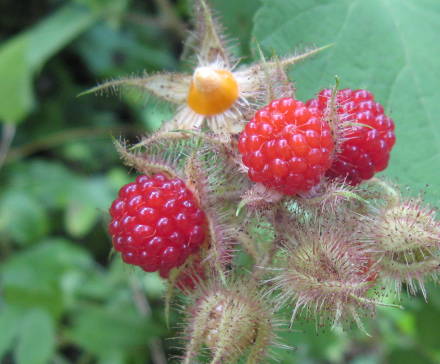I like growing things. I think it is part the connection to system thinking I have had since I was a kid. I like finding ways to leverage my effort so that I put in a bit of thought and effort and then get to enjoy the fruits of that effort for a long time. This idea also guides my investing approach.
I planted a vegetable garden in my yard a few years ago. My strategy was to find methods that gained me what I wanted (yummy food) without much effort required from me. I don’t want to deal with persnickety plants. Basically I composted leaves, grass and yard waste. I put that into the garden spot and put in some seeds and small plants to see what would happen. I watered things a bit early on and if we had very little rain for a long time. But in general my attitude was, if I could get success with some plants with this level of effort that was good. Only if nothing would grow would I bother with more involvement from me.

Wineberries in my backyard.
Luckily it turned out great. Lots of great tomatoes and peppers and peas and beans and cucumbers and more, and very little effort from me.
I actually even had more success with wineberries. I didn’t even have to plant them (some bird probably seeded them for me and I just let them grow). It was wonderful for several years. Then I had a huge area with huge amounts of tasty berries: it was wonderful. Sadly then birds started to eat them before I go them and I got far fewer good berries than before. The berries were so good I went to effort to keep the birds from devastating my reward (to some success but with much effort). Oh well, I didn’t really mean to get onto that – those berries were just so great.
Now I am living in Malaysia and growing plants on my balcony. It is wonderful in many ways but one of the issues is I have to continually water the plants. Even though we get a great deal of rain, not nearly enough reaches the plants (and also the dirt doesn’t retain the water well – especially given the small volume of the containers). So if I want the fresh vegetables I have to continually water the plants. This goes against my desire to plant seeds and let me sit back and enjoy the bounty of my limited efforts (ok it is still pretty limited).
While watering the plants today I was struck with the notion that I think managing people takes more continual feeding that we want to admit. I think this is certainly true for nearly all organizations. If the organization has really done a great job of creating the rich soil and a natural system to meet all those needs (coaching people, monitoring systems, improving processes, dealing with problems, eliminating de-motivation, learning…) then, maybe, a manager may not need to constantly be thinking of all these tasks that take continual attention.
But I think most organizations today require the manager to continually feed the system in order to make sure the important efforts don’t wither and die. If I didn’t really want my fresh vegetables I would just not bother with the continual feeding my current setup requires. But I do, so I have to make the effort to continually feed the plants the water they need to prosper.
Creating a system where continual feeding is not needed is great. But if that isn’t the state of the organization yet, then continual feeding is required: or your improvement efforts will fall short of the potential gains, or die altogether.
Related: Building on Successful Improvement – Building a Great Workforce – People are Our Most Important Asset
For my balcony plant case I do think I can improve the situation with some system improvements. But I haven’t figured out great ideas to try yet. If you have good lean suggestions (simple, not expensive) let me know (especially for how to deal with me leaving for so long the plants struggle and some die).


Hi John
As a gardener and son of a farmer, in the long haul there is no such thing as a garden that doesn’t need feeding. Sooner or later what gets taken out needs to be replaced.
In business their are two types of organizations those with a solid base to work from, they are like your former home garden, they need farless feeding and attention. The other type of business are basically built with a foundation, they are like your balcony garden, they need constant feeding and care because they lack a base to support them.
No organization can stop feeding its people, but they can reduce the effort required to feed them if they build the base or foundation to support them.
I like the analogy in this post which in essence stresses how important systems are and why you need to closely monitor interactions if the system itself can’t be directly controlled. Of course this thought process emanated from the likes of Deming and Ackoff. Indeed Deming said, “A bad system will defeat a good person every time.” The biological system you describe is one of the most complex, made even more unpredictable as humans are involved. Good luck with your gardening efforts!
Pingback: Let's Grow Leaders | Inspired Leaders, Confident Humility, & Breakthrough Results | Experts Share Their Thoughts on “Spring Cleaning:” A Frontline Festival